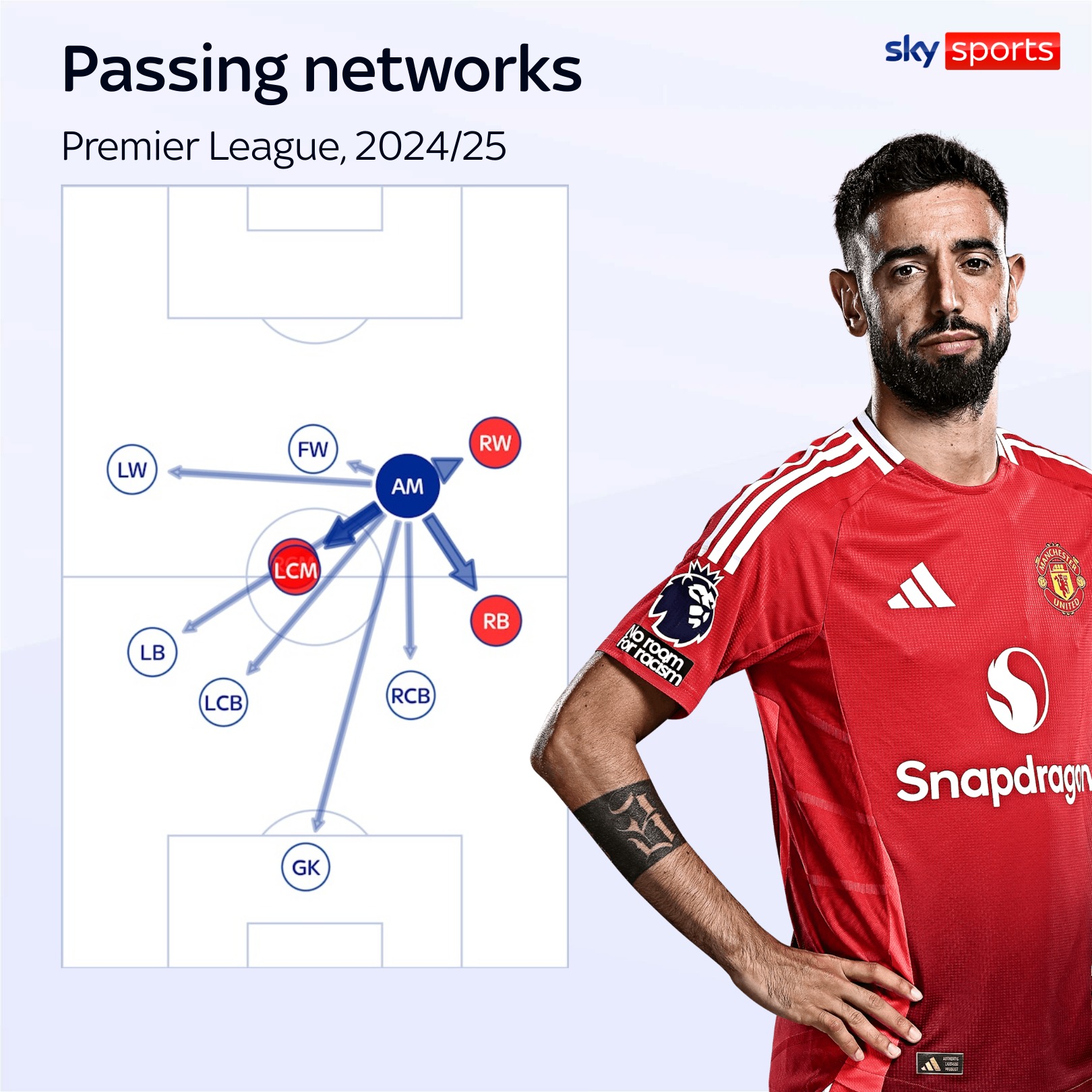Bruno Fernandes' Man Utd form analysed: Positioning, pressing and creativity all part of the problem?
Bruno Fernandes is struggling for form but why? With insight from those who know the Manchester United captain well, Adam Bate examines the dip in performance, the reasons for it, and makes a case to defend the Portuguese playmaker’s record
Saturday 19 October 2024 16:39, UK
When Bruno Fernandes curled a free-kick against the crossbar in Manchester United’s goalless draw against Aston Villa, he looked to the skies, cursing his misfortune. It has been that kind of season for him so far, the worst of his career in English football.
He had been similarly close to scoring against Crystal Palace, close even to winning the ball in the incident that saw him sent off away to Porto. Fine margins are going against Fernandes, the form lost and even his future role in this United team being questioned.
Now 30, Fernandes has seen more cards than wins this season. Nobody has had more Premier League shots without scoring. Bad times for a player so good. As he himself put it on social media, this is a tough moment. "Personally, for me, one of the hardest."
With this dip in form, comes the noise. There is that old issue of his leadership credentials, the suspicion that his emotional disposition makes him ill-suited to the role. Speaking to Sky Sports, United's former assistant manager Steve McClaren dismisses that idea.
Roy Keane was United's captain when he first arrived at Old Trafford. McClaren has seen them all. As a result, he has more reason than most to push the line that Fernandes is not up to it. Instead, he remains a passionate advocate of the current skipper.
Trending
- Newcastle cruise to victory as Isak nets hat-trick LIVE!
- West Ham hold on to draw with Brighton LIVE!
- Forest beat Brentford to move third LIVE!
- Jesus starts, Havertz in midfield for Arsenal vs Palace LIVE!
- Rangers holding on to one goal lead vs Dundee LIVE!
- What time are Usyk and Fury in the ring?
- Usyk vs Fury 2: Epic undercard begins ahead of heavyweight showdown LIVE!
- Man City beaten again at Aston Villa LIVE!
- EFL: Leeds, Sunderland, Sheff U win; Rooney's Plymouth & Carrick's Boro draw 3-3 LIVE!
- World Darts Championship: Dobey avoids mid-match scare to win LIVE!
"I looked at the challenge," McClaren says of the dismissal in Porto. "Bruno's going for the ball. He doesn't go for anything else and he's wholly committed. That's what he is. You like him, you hate him… I love him." He even chooses to evoke that name of Keane.
"He leads by passion and sometimes that's good and sometimes that's bad. I remember the old days of Roy Keane. He led with passion and sometimes it was good and sometimes it was bad. And the press, well, they had their own opinions on it."
McClaren's memories of Fernandes are fond ones. He recalls those long conversations about tactics, a player absorbed by the game. "I think he is a great player, a great personality and what a gentleman. He will talk football all day, very knowledgeable."
None of which are excuses for the sort of dip in performance that Fernandes is enduring, but one wonders whether it is an image in need of reframing. This is no entitled or indifferent superstar, but a player who will be feeling his own failings deeply.
Bruno's background
The context of his career is important to note. Fernandes did not come through one of the big academies in Portugal, beginning his journey as a centre-back before having to go to Novara in Italy to prove his worth. His has been an unusual route to the top.
There were the skills, of course, but he has always been a scrapper. That was how he got his move to Sporting, as the club's former director Andre Geraldes explains. "Jorge Jesus and I went to watch a Portugal U21 game on a cold winter day," he tells Sky Sports.
"We both understood that we had found our man. We needed to find a midfielder who could score goals, play between the lines in the last attacking third. He was capable of playing and making others play, bringing a different kind of rhythm to the game.
"Bruno had not played for a big club with great demands, the need to be a champion, but he quickly adapted because of his mentality. He was mentally strong. When things were not going well, he did not shy away. And he improved technically and tactically."
His second season with Sporting brought 33 goals and he was off to Manchester United midway through the third. "Bruno left a legacy in Portugal," says Geraldes. "That was evident to everyone. There are not many midfielders in the world with his capabilities."
Perhaps that is worth restating at a time when Fernandes is struggling. While his explosive start in a United shirt - 40 goals in his first 80 appearances - was unsustainable, his creative number since his Old Trafford debut remain remarkable.
He has created 453 chances in the Premier League since then, 62 more than his nearest rival Kevin De Bruyne. Fernandes' individual importance to his team has been greater, creating a higher proportion of his team's chances than the next players on the list.
But something has changed. This season, Fernandes' creative numbers have fallen off a cliff - as the following graph shows. A player who had previously been creating around three chances per game is now struggling to muster one. It is a dramatic decline.
What is the explanation?
Why is this happening? Fernandes has long been criticised for being loose in possession - only Trent Alexander-Arnold has lost the ball more times since he arrived in the Premier League. But this has been an acceptable trade-off given his creativity.
Indeed, outwardly, Erik ten Hag has encouraged Fernandes to continue trying the most difficult passes precisely because he has a rare ability to deliver. Putting this question of Fernandes' ambitious passing to Ten Hag last season, he explained his reasoning.
"We have to give him support, give him the confidence to keep doing it because he is such a genius at giving that final pass. It demands a lot. Firstly, intelligence. But also personality when it goes wrong several times and you keep trying to do it."
While Fernandes is seeing as much of the ball as ever, he is actually losing possession less than ever before. Has he become too risk-averse? It is a thought. But not a satisfactory explanation. He still plays more line-breaking passes than anyone else.
A more plausible reason for this alarming decline could be related to a lack of options when on the ball. Interestingly, there is some statistical evidence to support this argument as a result of the tracking data that underpins the Second Spectrum numbers.
These reveal that of the 100 players to have attempted the most passes this season, Fernandes has had the fewest options available to him upon receiving possession - an average of just 1.54. That is down on last season and the fewest of any United player.
Compare that to, say, Manchester City's Ilkay Gundogan with 2.87 or even Fulham's Emile Smith Rowe with 2.73 and a picture starts to build of a player who feels that responsibility to make things happen for his team but lacks the opportunities to do so.
The increased restrictions on Fernandes' positioning may be playing a part in this. The Portuguese playmaker has enjoyed a roaming role for much of his United career but the evolution of his heatmaps season-by-season suggest that this is no longer the case.

The easiest explanation when a player is unable to find their best form is to question their work rate but that does not chime with the experience of watching Fernandes. He runs. In fact, he boasts some of the best pressing numbers in the Premier League.
Fernandes ranks among the top 10 players in the competition for sprinting pressures, counter-pressures and indeed distance covered while pressing this season. The concern centres around how effective that pressing has been. It is not working well.
When it comes to actually forcing a turnover in possession as a result of that pressing, Fernandes' numbers decline sharply - he ranks only 47th on that metric. These struggles reflect the struggles of his side. There is working hard and working smart.
How do his long-time admirers feel about the criticism that Fernandes is now facing over his performances? Geraldes certainly does not feel the blame lies solely with the player. "I am not pointing fingers, I am just sharing my opinion," he is keen to stress.
"The internal management of each club should understand its assets and manage them in the best way. The hardest part is always finding talent. After that, for me, it is about sports management, whether that is from the coach's side or the management's."
Like McClaren, Geraldes still sees a natural leader. "It was no coincidence that he was captain of Sporting, nor is it a coincidence that he is captain of Manchester United. Bruno has that leadership spirit, a leadership profile that is not so common to find."
One day, the hope among the Sporting faithful is that Fernandes will return to lead them again. It is a possibility that their old director is willing to entertain. "What I believe is that Bruno has in his sights on being able to represent Sporting again," says Geraldes.
"He himself never shied away from publicly stating that he had a strong connection with the club, and he also has no doubt that he is adored by the fans. I have the idea that, if this possibility arises in the future, the conditions will be met for Bruno to return."
But that is for the future. Solutions are needed in the present if Fernandes is to turn his season around at Manchester United. Geraldes is backing him because he has seen it before. "He can reinvent himself in adversity." It might be his biggest challenge yet.












